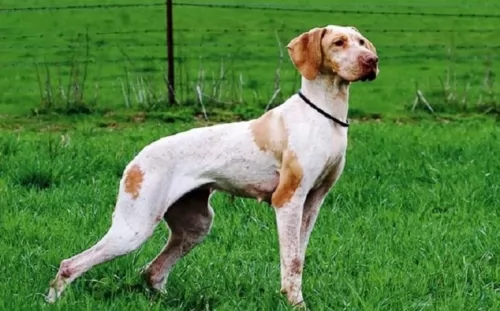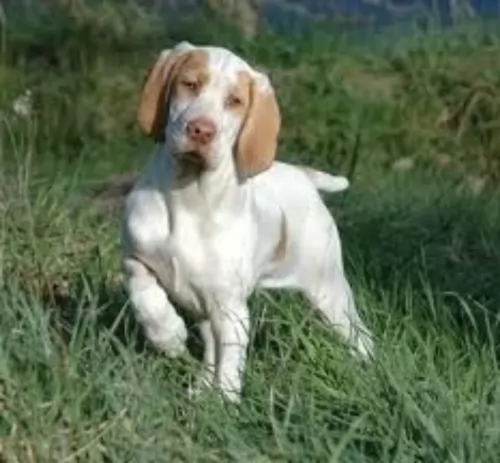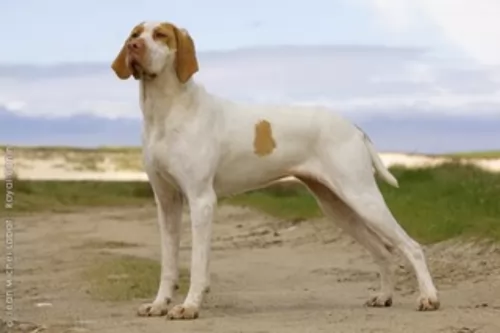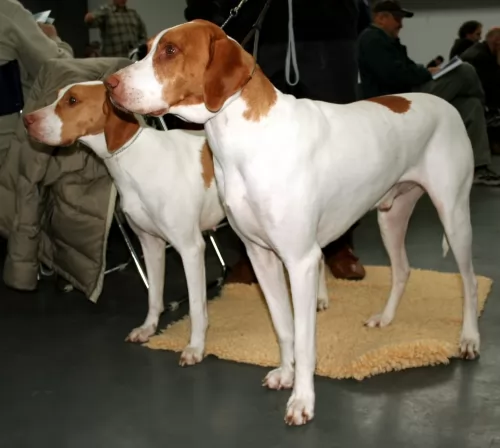 Petzlover
Petzlover Ariege Pointer is originated from France but Tsvetnaya Bolonka is originated from Russia. Ariege Pointer may grow 40 cm / 16 inches higher than Tsvetnaya Bolonka. Ariege Pointer may weigh 26 kg / 58 pounds more than Tsvetnaya Bolonka. Both Ariege Pointer and Tsvetnaya Bolonka has almost same life span. Ariege Pointer may have more litter size than Tsvetnaya Bolonka. Ariege Pointer requires Low Maintenance. But Tsvetnaya Bolonka requires Moderate Maintenance
Ariege Pointer is originated from France but Tsvetnaya Bolonka is originated from Russia. Ariege Pointer may grow 40 cm / 16 inches higher than Tsvetnaya Bolonka. Ariege Pointer may weigh 26 kg / 58 pounds more than Tsvetnaya Bolonka. Both Ariege Pointer and Tsvetnaya Bolonka has almost same life span. Ariege Pointer may have more litter size than Tsvetnaya Bolonka. Ariege Pointer requires Low Maintenance. But Tsvetnaya Bolonka requires Moderate Maintenance
 The Ariege Pointer is a French hunting dog, coming from the Ariegeois region of France.
The Ariege Pointer is a French hunting dog, coming from the Ariegeois region of France.
Known as the Ariege Pointing Dog, French Pointer or Braque de l’Ariege, these dogs came from the old French Braque dogs that were crossed with the orange and white Southern Braques.
It was in 1990 that a team of breeders decided to devote themselves to the breed’s survival. The Braque de l’Ariege was recognized by the United Kennel Club in 2006.
 It is believed that the dog’s ancestors are the Toy Poodle, Pekingnese, Bichon Frise and Shih Tzu. The Russian Tsvetnaya Bolonka has also become more well known since the British royal couple, Willam and Kate, have them as pets.
It is believed that the dog’s ancestors are the Toy Poodle, Pekingnese, Bichon Frise and Shih Tzu. The Russian Tsvetnaya Bolonka has also become more well known since the British royal couple, Willam and Kate, have them as pets.
 The Ariege Pointer has always been a dog kept essentially for hunting and not as a companion dog. He stands between 55 – 67cm and weighs 25 – 30kg.
The Ariege Pointer has always been a dog kept essentially for hunting and not as a companion dog. He stands between 55 – 67cm and weighs 25 – 30kg.
He is an attractive looking dog with quite a large head while the body is sleek and slender to look at. The ears are quite large and are floppy while the tail is traditionally docked to give him that distinctive look. These days the tail is often left long and hangs downwards.
The coat is short, single and rough and is white with tan or orange patches. The coat can also be speckled or ticked.
The Ariege Pointer is a hunting dog who is friendly towards strangers and therefore won’t make a particularly good watchdog.
These dog are lively, independent and good natured and they make excellent companion dogs. They are fairly docile and and get on well with children and pets in the home. Just like with any other dog, they need to be trained and socialized early.
 The Tsvetnaya Bolonka is a small dog standing at 22 – 27cm in height and weighing between 2 and 4kg. He has been developed to be a companion dog.
The Tsvetnaya Bolonka is a small dog standing at 22 – 27cm in height and weighing between 2 and 4kg. He has been developed to be a companion dog.
The long coat of the dog is wavy or curly and is a grey color, brown, red, white or black. The males have a beard and mustache.
Allergy sufferers appreciate that the dog doesn’t shed but the coat will need to be brushed to prevent matting. The ears are medium length and the tail curls up over the back.
These dogs are sturdy, happy, social, playful little dogs with a loving, loyal temperament. They’re balls of fun and make super playmates of disciplined children who have been taught to be kind and gentle with animals.
They are well balanced, amicable dogs with a streak of independence. They’re intelligent too and will respond well to training and socialization.
He isn’t aggressive and isn’t a yapper either. He is a friendly dog, even with strangers but he can still prove to be a good watchdog. Small and compact, he can do well in the countryside or the city.
 The Ariege Pointer has always been an excellent pointing- and hunting dog. When it comes to being a family pet, he puts his hunting skills aside and becomes a loyal, loving, friendly pet.
The Ariege Pointer has always been an excellent pointing- and hunting dog. When it comes to being a family pet, he puts his hunting skills aside and becomes a loyal, loving, friendly pet.
They are considered to be rare dogs, and were at one time bordering on extinction. Those who have owned one of these hunting dogs will be glad to know that they are no longer considered endangered. They’re not your friendly, social kind of dog that you find in other dog breeds, but with training and socialization he will make a fine companion and family friend.
 The Tsvetnaya Bolonka is a true companion being even-tempered, intelligent and friendly. He has been specifically developed as a companion dog whether you live in the city or the countryside.
The Tsvetnaya Bolonka is a true companion being even-tempered, intelligent and friendly. He has been specifically developed as a companion dog whether you live in the city or the countryside.
He gets on well with children and with other pets in the home and even towards strangers. Just remember that wherever you choose to live with your sweet little pet, he will still need regular exercise to remain the feisty, happy little dog he is.
 The Ariege Pointer is a working dog breed, used for hunting and retrieving prey. With good care the dog can live to be a good 12 – 15 years of age.
The Ariege Pointer is a working dog breed, used for hunting and retrieving prey. With good care the dog can live to be a good 12 – 15 years of age.
However, with every dog breed there are common dog diseases to watch for. This dog has long floppy ears and these can get damp and will need to be cleaned and dried regularly otherwise the long ears can be prone to infection.
Apart from being prone to health issues such as an ear infection, you want to be aware of very common dog ailments such as hip dysplasia which can cause lameness in your dog.
Whatever illness your dog has, and you see he isn’t acting his usual self, get him to the vet for a check-up and then make sure that all treatment and medication prescribed is adhered to.
 This breed may get some of the typical small-dog health conditions. These can be things such as dental problems, obesity and Patellar Luxation.
This breed may get some of the typical small-dog health conditions. These can be things such as dental problems, obesity and Patellar Luxation.
Small dogs often have problems with their knees, and patellar luxation is a common orthopedic condition for small dogs. You’ll see your dog walking on 3 legs.
A luxated kneecap can move out of place, but in some more serious instances, it can dislocate completely. Treatment will require a visit to the vet. Sometimes surgery is required.
Small dogs are more prone to dental disease than large dogs. Tartar and plaque form, there is gum recession, and loss of teeth is common with these little dogs.
Check inside his mouth regularly. Brushing the teeth can be of value to the dog and you get special canine dog and toothpaste. A tooth infection can be serious for your pet and cause him to have toxins circulating in the bloodstream that can make him sick.
 Your attractive Ariege Pointer will give birth to 2 – 8 puppies. If you don’t want puppies, then spaying or neutering is excellent and can actually have many health benefits for your pet.
Your attractive Ariege Pointer will give birth to 2 – 8 puppies. If you don’t want puppies, then spaying or neutering is excellent and can actually have many health benefits for your pet.
This dog with its short coat requires very little maintenance, and a good brush twice a week will ensure the coat remains glossy and shiny, giving you the chance to also check for fleas and ticks.
Don’t just assume every dog has bad breath. Bad breath can be indicative of dental disease, and dental problems can cause all kinds of other illnesses within the body. Make sure that while your pet’s teeth are healthy, that you brush them 2 or 3 times a week with special canine toothbrush and toothpaste.
The Ariege Pointer requires regular exercise as it is a lively, energetic dog. He can adapt to life in the city or the country, but ideally he needs a place with a large garden.
Wherever you keep him as a pet, make sure you take him for walks every day and that you play ball- or rope games with him. Ignoring his exercise needs will turn him into a bored, frustrated pet, and that isn’t fair towards him.
Make sure you choose good quality commercially manufactured foods for him. Adding in some home-made food to his kibble such as cooked brown rice, vegetables and chicken will be wonderfully good for him.
Every dog will require some raw meat added into his diet from time to time. Many skin diseases can be treated by adding in raw meat. After all, before dogs were domesticated they lived on raw meat, and including this ingredient back into their diet guarantees to make a remarkable difference in terms of good health.
 These little dogs will need a walk each day. They also love all sorts of games both indoors and outside.
These little dogs will need a walk each day. They also love all sorts of games both indoors and outside.
Brush the hair regularly to avoid matting. Many people tie the hair around the face into a ponytail. If the hair becomes dirty, it can be gently shampooed with a mild, natural shampoo and conditioned. The wet hair will require a wide-tooth comb to comb the hair.
Feed your dog the best dry kibble that there is. Check the packaging and make sure the ingredients are the best, full of vitamins and minerals. Try to give him some tasty home-made food such as boiled chicken, brown rice and vegetables. Remember to chop it up very finely. Never give your dog foods such as chocolate, popcorn, peanuts, and spicy food. It can upset his stomach. Make sure he has constant access to fresh, cool water.
Get your little pet to the vet if he shows signs of illness and make sure his vaccines are up to date to avoid deadly canine illnesses.